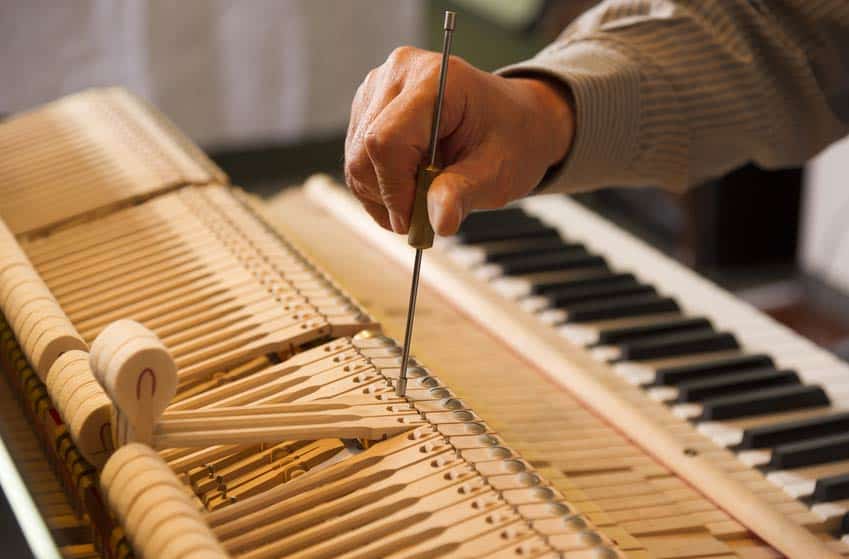Music Career Finder
Start Here:
Piano Tuner-Technician

How To Become a Piano Tuner-Technician
- Career Description
- Salary
- Career Outlook
- Career Path
- Experience & Skills
- Education & Training
- Additional Resources
- Sources
- References
Career Description
“A typical day for a Piano Technician would be making house calls and ‘on location’ service calls,” says Nashville-based Piano Technician and musician Jon Loyd. “Primarily, Piano Technicians are called in to tune the piano, but other repairs and services are commonly needed in addition to tuning. Piano Techs work in homes, concert halls, large venues, small venues, clubs, churches and anywhere pianos live!
“Pianos are large, heavy, and not easy to transport like a guitar or flute. Therefore, the Technician must often travel to the location of the piano. Some Technicians work primarily in the field of rebuilding pianos. They spend more time in a workshop, where the piano is, in fact, brought to the shop and rebuilt in various stages based on the customer’s wants/needs.”
Because of the wide range of places where pianos are found, Piano Techs work with all kinds of people, including Musical Instrument Builders, Concert Hall Managers, Nightclub Managers, Orchestra Managers, Composers, and musicians of all sorts.
Salary
The average annual earnings for a Piano Tuner-Technician equate to approximately $39,500. The salary range for Piano Tuner-Technicians runs from $22,000 to $109,000.
Piano Techs earn set fees per tuning, with the general fee ranging from between $100 to $185.
Hey, what do you think about trying our new Music Career HelperMusic Career Helper really quick? It’s totally free and could help get your career moving fast! Give it a try. It’s totally free and you have nothing to lose.
Career Outlook
Piano Technicians mostly work during standard business hours, although if there are emergencies at a venue or concert hall, a Tech could find him or herself working late. For the most part, though, they get to set their own hours. “This is most often a self-employed profession,” Loyd says. “So if you like working independently and being your own boss, this is a good field.”
Career Path
Since the majority of Piano Technicians are freelancers, advancement comes as the Tech begins working regularly with more prestigious and better-paying clients.
To land a job as a Piano Technician, Loyd says, “Your ambition and willingness to learn is essential. Apprenticeship is the best and most common, way to get started.” After a successful apprenticeship, a Piano Tech can build on the connections they’ve made and then strike out on their own.
- Have a working musical knowledge of the piano. Take lessons.
- Learn the basic woodworking skills needed to make repairs.
- Research apprenticeship and/or training programs and find an experienced Piano Tech to mentor you.
Experience & Skills
In addition to musical skills, Loyd says, “Woodworking and musicianship are things I would say are good skills for a Piano Technician. Nearly the entire piano is contracted of wood; therefore, woodworking is an essential skill in repairing and building pianos. Piano tuning does not require perfect pitch, but it helps to have a musical ear when tuning by ear.”
Like many Piano Technicians, Loyd grew up with the instrument. He says, “I have played piano since I was a child, and work professionally as a musician and piano player/keyboardist. For me, I have been familiar with pianos all my life; the function and adjustment of the instrument were a natural curiosity for me.
“I lived and worked in New York City for nearly ten years. During that time I worked for a Piano Rebuilder as a full-time job for nearly two years. This was the foundation of my understanding pianos from a technical understanding.
“As a professional musician, I have toured with country artists, pop artists, and rock ‘n’ roll bands and continue to do so. That’s a whole other subject, though.”
Because of all the years of technical training required to become a Tech, anyone who aspires to the profession must be passionate about it. Loyd adds, “Anyone that enjoys music, repairing instruments and improving the overall quality and function of things will enjoy the piano technology field.”
Education & Training
Loyd says, “Becoming a Piano Technician involves extensive training and experience. Often, it would involve apprenticeship of some kind, then working in the field for years on hundreds to thousands of pianos.
“Only through repetition and continuing education throughout a Piano Technician’s career, (which will include learning from older, more experienced Technicians) can he/she learn the mastery of this trade. There is formal educational training available as well. The Piano Technicians Guild is a good resource for what is currently available.”
Additional Resources
“The Piano Technicians Guild is the only accredited organization in the industry of piano technology,” Loyd says. Membership in the guild means that a Tech has the necessary experience and education to be hired.
Sources

Jon Loyd
Jon Loyd is a Nashville-based Piano Technician with the company Piano Tuning of Nashville. He is an associate member of the Piano Technicians Guild.
Loyd is a Songwriter, vocalist, and keyboard player with the band Cordovas. As a musician, he has performed with Chris Barron (Spin Doctors), Gavin DeGraw, Jimmy Wayne, Steel Magnolia, Chris Young, Meghan Linsey, Sandra Bernhard, John Popper, and Mike Gordon, among others.
References
- 1Multiple. "Average Piano Tuner Salary". PayScale. published: Oct 27, 2019. retrieved on: Dec 18, 2019